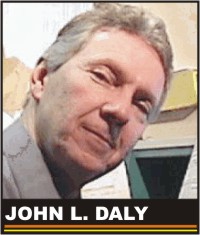
John L. Daly
JOHN L DALY
REPORTER, GLOBAL BC
John L. Daly reports for the noon,
The favourite part of his job: "Watching the smiles spread
across the faces of the people we help."
Of all his accolades, John is proudest of his first Webster
Award, when it was still for the best reporting of the year, in any medium,
placing his cameraman, editor and himself against other TV, radio, magazines,
and newspapers.
John says his most embarrassing on-camera moment came when he
was seen standing silent while a jet took off for what seemed like a full
minute.
***
2002 - So when I hear that it was just one of those lucky
coincidences that led a BCTV camera crew to stake out Premier Glen Clark's home
moments before the RCMP showed up with a search warrant, I say: Yeah, right.
The story is that BCTV reporter John Daly, who'd been following
the RCMP investigation of a poker club at the North Burnaby Inn, heard after
Tuesday's raid that another search warrant was to be executed that day. On a
"hunch," he staked out the premier's house.
And as several hundred thousand TV-viewing British Columbians
now know, the hunch paid off. When police showed up to search
***
1987- The plates were cleared, the bar was closed and the winner
of the 1987 Jack Webster Award was John Daly, for his BCTV News reportage of
the Winterton affair.
He collected $2,500 and the praise of his peers in the audience
as well as on the podium.
Daly beat out CBC's Rick Ouston, BCTV stablemate Eli Sopow, and
the
Daly said that: " You ask yourself what's important - if this
story never gets told, what are the implications?"
Daly described his story (in which a former
He kept digging, and found a story.
Webster, who presided at the awards presentation, said:
"I'm proud of the journalistic profession. The skills required today are
incredible - I wish sometimes reporters had the power to make politicians
answer under oath."
Knowlton Nash, anchorman of the CBC National and keynote speaker
said that journalism is "history on the run", and that "the
media is an agent for the public".
Awards aside, he said the job of reporting in the silicon-chip
age "isn't being done well enough - the quality of information does not
equal the quantity of knowledge" and urged journalists to "be better
agents to the public."'
He cast a knowing eye on Webster and called him "a Scottish
god of journalism, looking down from on high" and reminded the dour
Webster that "old journalists never die, they just lose their
frequency."